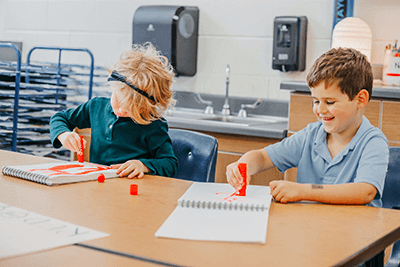September 11, 2025
 from Dr. Lori-Anne Brogdon, head of school
from Dr. Lori-Anne Brogdon, head of school
This week marks our first full week of the 2025-26 school year. Typically, the start of the school year is filled with both excitement and nerves. For some, returning to a typical school day is easy, while for others, transitions can take time.
Being in a PreK-12 community provides all of us with the opportunity to be part of our students’ most formative years of growth and development. As adults, we know that students move along a curve of academic, emotional, and physical growth that allows for the strengthening of skills that foster independence, communication, and self-awareness. At the start of a new school year, we know most students need time to adjust to new and familiar faces, daily schedule, and movement patterns throughout the building, and managing the influx of information coming their way within and outside of the classroom setting. Whether your student is age three or 18, there is a lot to absorb, process, and respond to throughout the day. As an adult, I certainly know the same is true for myself, and perhaps you can relate!
Yesterday morning, I happened to be in a classroom with students studying statistics. One student was gathering data on how many hours each of their classmates slept the night before. The time ranged between six and nine hours. Just a short while later I happened to speak with a parent who shared their Middle School student had difficulty going to sleep because their brain struggled to settle down to allow for rest. These two interactions, among others over the past two weeks, remind me that as adults, it is important we remain mindful of our students’ experiences, especially the ones we don’t always see or hear about.
Regardless of their age and whether they like it or not, students benefit from our assistance in setting and maintaining routines. We can do this by ensuring they eat healthy food throughout the day, establishing a productive space to complete homework, reviewing the schedule for the day or the upcoming week to help prepare for changes in routine, and emphasizing the development of healthy sleep hygiene. Acknowledging and providing positive affirmations as they adjust helps to normalize the sharing of any feelings and physical reactions they might be experiencing. If your student already has a routine that seems to be working for them, that’s amazing! With or without struggles during times of transition, it still helps to check in occasionally. Doing so allows your student the opportunity to reflect and identify effective life-long skills and habits they are building.
As we move into the school year, if you happen to notice your student is struggling (currently or in the future) please reach out to their classroom teacher, advisor, school counselor, and/or respective division director. Maintaining a strong home-school connection is very important to us. Being a part of the MPA community means we are all in this together!
As always, I thank you for your collaboration and support of MPA.